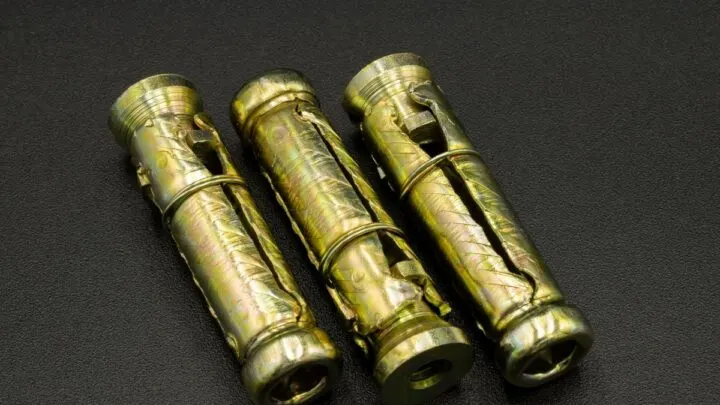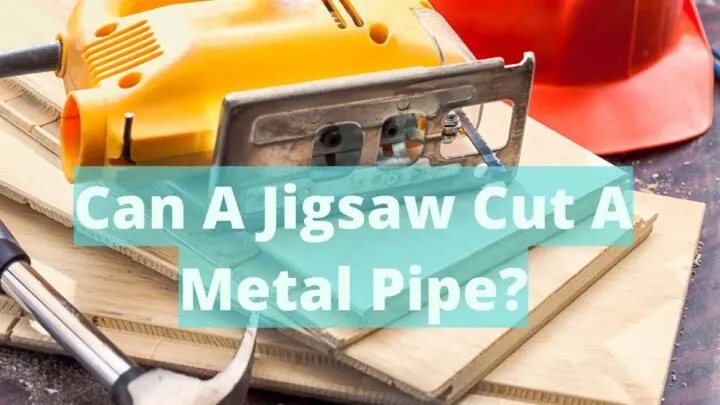You need to cut a few metal pipes, and doing it by hand will be too exhaustive. You also happen to have a jigsaw lying around.
Can a jigsaw cut metal pipe?
Jigsaws are excellent for cutting straight lines, making patterns, and making large holes on sheets of different materials. They can be used to cut through anything from plastic, wood, ceramic tiles, and even sheet metal.
Jigsaws can cut metal pipes, but they’re not the best tool for the job. Most jigsaws can easily slice through up to half an inch of steel, or around 1.5 inches of other nonferrous metals, like aluminum.
The blade and jigsaw being used must be of good quality.
If you have used a jigsaw to cut wood and plastic, you will find cutting metal pipes a different experience.
It would be best if you used blades that have the correct hardness and TPI rating for cutting metal pipes.
Tool experts state that jigsaws can cut metal pipes, but using jigsaws is not recommended.
However, you can use the tool if you don’t have other pipe-cutting tools available.
It is essential to use high TPI rating blades and work through the pipe slowly and steadily.
Cutting metal with metal can cause heat to build, so allow your equipment to cool down if you are cutting multiple pipes.
Which Blades Cut Metal Pipes?
To begin with, you will need to select the correct blade that is suited to handle the hardness and strength of the metal pipe.
When choosing a blade, you need to consider two factors: the material that the jigsaw blade is made of, and the specifications and number of teeth that the blade has.
The Cutting Teeth
Jigsaw blades come with different types and numbers of teeth. In addition to the size, the manufacturing process can significantly affect the blade’s cutting ability.
There are two different processes used for manufacturing blades; milling and grinding.
Milled teeth are not as sharp, but they are more durable and maintain their performance for longer.
On the other hand, ground teeth are sharper but tend to lose their cutting ability much quicker.
TPI Ratings
The number of teeth on a blade is denoted by TPI or teeth per inch. This number will let you know how many teeth are in one inch of the cutting area.
Jigsaw blades are typically rated between 6 and 24 TPI – a 20 TPI blade will have 20 teeth per inch.
Irrespective of the TPI rating, the size of jigsaw blades is somewhat similar.
The only way to fit more teeth in an inch of the blade is to make the teeth smaller. Smaller teeth take away less material in each stroke.
This means that higher TPI blades cut slower than lower TPI ones. However, smaller teeth also result in a better finish.
Since metal pipes are hard and robust, they must be cut through slowly and steadily. A higher TPI blade is recommended for cutting metal.
Using a lower TPI for hard materials will often damage the blade, the workpiece, or both.
Material of the Blade
In addition to the teeth specifications, you will also need to pay attention to the material of the blade.
Several different blades are available, and some are softer and more flexible than others.
High Carbon Steel
High carbon steel is an alloy that comprises iron mixed with manganese and significant amounts of carbon. Blades made with this material are soft and flexible.
They do not heat up as much as other harder materials and often last longer when used to cut appropriate materials.
High carbon steel blades are best used for cutting softer materials such as aluminum pipes or copper tubing. They are not suitable for harder materials like galvanized iron or steel pipes.

High-Speed Steel
High-speed steel is a hard material, which, as the name implies, is suited for situations that involve rapid movement.
It is among the toughest materials used for jigsaw blades and can easily cut through thick pieces of wood, carbon fiber, and metals.
Due to the hardness of the material, high-speed steel blades are prone to overheating, especially when cutting through hard materials such as metals.
These blades can quickly cut through metal pipes, but remember to allow the blades to cool down either by using cutting oil or letting the blade rest frequently.
Bimetal – The Best of Both Worlds
Going through the properties of blades above, you might think that why don’t we design a blade with the cutting power of high-speed steel and the flexibility and heat dissipation of high carbon steel?
We have some good news for you. Someone already did that, and they are available in the market as bi-metal blades.
These blades are comprised of teeth made of high-speed steel, while the blade’s body is made of high carbon steel. They don’t heat up as much and can last longer than high-speed steel blades.
They can be used for cutting hard materials such as iron and some forms of steel.
Tungsten Carbide
Tungsten carbide blades are manufactured from a special alloy of carbon and tungsten.
The alloy is tough and can cut through hard materials such as steel, galvanized iron, and others.
These blades often have a coating of tungsten carbon on the sides, which allows them to produce a finer cut.
Cutting Metal Pipes With A Jigsaw
It is best to choose either a bimetal or a tungsten carbon blade whenever you are cutting metal pipes.
You should aim for 22 TPI or higher when selecting the blade. Ensure that the pipe is clamped correctly and secure before presenting the blade.
Operate the jigsaw at moderate speed, and allow the blade to work its way through the entire cross-section of the pipe without forcing the jigsaw.
It helps to draw a line along the circumference of the pipe to help you maintain the correct line.
For improved cutting performance, you should use powerful jigsaws with longer strokes and variable speeds.
They will make cutting harder materials easier and will last longer.
Summing Up If Jigsaws Can Cut Metal Pipes
Yes, jigsaws can cut metal pipes, but they’re not the most recommended tool for the job. If you for sure want to use a jigsaw, however, make sure you have one with a high enough TPI and aren’t cutting through anything too thick.
This could both ruin your metal pipe and your tool. Make sure you consult a professional if needed!


